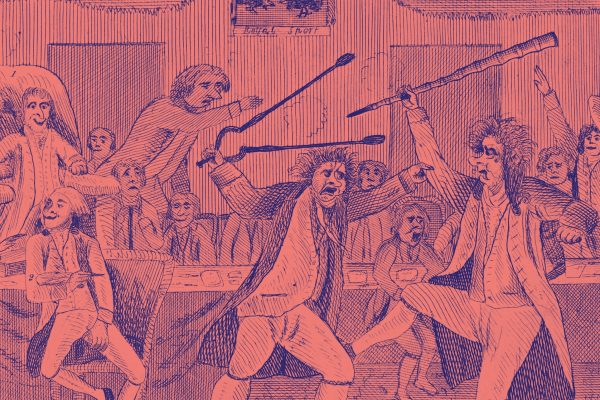It’s true that I didn’t bring Sanford Levinson’s books and articles on modern constitutional reform into my criticism of the view of founding history presented at the Constitution Center. It’s true too that I’m not as well-versed on Levinson’s and others’ ideas about reform as I should be. Levinson, for his part, doesn’t find discussing the founding as important as examining the impact of the Constitution today, and he is manifestly unaware of my work. The comedy version: two disconcerted authors, each dismayed by the other’s lack of interest.
But Levinson’s unawareness seems to extend even to the piece he’s reviewing. In that sense, our differences may point to something potentially interesting. He says, for example, that I compare the Constitution Center to the Memorial to the Victims of Fascism and Militarism. I really say that all of public history bears a problematic relationship to the approach taken to extremes at the Memorial. He says I call for a return to “a basically Beardian take on the founding period.” Even letting “basically Beardian” stand for the many nuances in progressive history I discuss, what I really explore is the damaging absence of multiple interpretations, including those he reduces to “Beardian,” among the narratives at the Center.
Those misreadings gain significance when Levinson gets into race, gender, and class and the nature of consensus history, of whose blinkered viewpoint he turns out–possibly ironically, and quite intriguingly–to be a prime exemplar. He asserts that after the 1950s, historians “easily added” race and gender to the list of historical subjects. Just how easy he thinks that was, and why, he apparently feels no need to show. I might agree that adding sex and race to public history can look easy when compared to adding class. As I tried to show, it’s a prevailing behavior of current consensus writers, including Amar, whose book Levinson admires, to bemoan race injustices while denying the importance of class. Despite his own angle on the importance of the debtor-creditor relationship, which Amar ignores, Levinson notes with approval that the Center pays significant attention to race and gender. He’s read my piece: he knows what I think of the quality of attention it pays to race. He allows that on class, the Center is “half-empty.” That’s as if the cliché were really a koan: “Is an empty glass half empty or half full?”
Most revealing is his assertion that I elided what he calls the central question: whether it would have been better if antifederalists had succeeded in preventing ratification. That suggests he thinks the question he cares about is self-evidently the central one. He continues to assume–in the face of what I actually wrote, and of what Nash, Bouton, Holton, and many others write–that antifederalism and sectional interest provide, by definition, the only worthwhile context for discussing conflict around founding nationhood. In admitting that, here and there, antifederalism and impulses for working-class democracy were connected, he only refocuses the discussion on opposition to the Constitution–the persistent theme of his approach. My point is that the Constitution came about in opposition to working-class democracy. Bouton’s point, as I write in the essay, is that while antifederalism seemed at times allied with populism, the two impulses were actually at odds. None of that seems to interest Levinson, or even to be clear to him.
It’s the old, depressing story. Consensus history has been so successful in framing what can be admitted to the discussion that even in a response to an essay that tries to get at some of the textures and nuances of stark difference, difference is–must be, it seems–elided. Conclusions are thus always of the same kind: foregone, banally liberal, and retrofitted to results. “Politics is often about truly dreadful compromises–the classic example is our alliance with Stalin in order to defeat the even greater evil of Hitler,” Levinson writes. Amid the consensus, apparently, that Hitler’s evil was greater than Stalin’s, and with the compromise having turned out, supposedly, to have been all for the best, there’s no need to get into that whole mess again. It’s the same with the U.S. founding: “The alternative to the Constitution that came out of Philadelphia was . . . no Constitution at all.” Levinson believes it follows that continuing to look back is a waste of time and that close criticism should be dismissed as founder-bashing.
It’s true that I’m no expert on Levinson’s projects. Yet I’m forced to wonder whether his peculiar approach to history may not be qualifying, at least somewhat, the success of his approach to politics.








